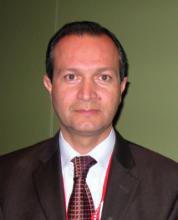CHICAGO – Patients with posttraumatic stress disorder had an increased prevalence of coronary artery disease as well as an increased risk of death in a retrospective analysis of more than 30,000 patients.
"We have proof for the first time based on coronary artery calcium that coronary artery disease is related to PTSD [posttraumatic stress disorder]," Dr. Ramin Ebrahimi said at the annual scientific sessions of the American Heart Association. "There is a significant association between the presence of PTSD, coronary atherosclerosis, and mortality independent of conventional risk factors."
"PTSD can be viewed, in a preliminary way, as a risk factor. While the findings have not been validated in a prospective, longitudinal study, this was a very large study with 286,000 people including more than 30,000 with PTSD," said Dr. Ebrahimi, codirector of the coronary catheterization laboratory at the VA Greater Los Angeles Healthcare System. "An early, integrative psychological and medical evaluation may be indicated to identify PTSD patients and improve quality of life and clinical outcomes." Studies have not yet examined the role that treatment of PTSD can play in mitigating the severity of coronary atherosclerosis and reducing mortality, Dr. Ebrahimi added.
Although proving a link between PTSD and coronary disease requires more evidence, an immediate message from the results so far is that physicians, especially primary care physicians, should be more aware of the high prevalence of PTSD. "It’s very prevalent, perhaps as high as 10% of the general population," Dr. Ebrahimi said in an interview. In addition, diagnosing PTSD identifies a patient who warrants a more careful assessment for coronary disease, he added.
"Dr. Ebrahimi’s report represents one of the largest studies to date to document a significant relationship between PTSD and mortality," with an effect size roughly comparable to prior reports, commented Donald Edmondson, Ph.D., a psychologist in the Center for Behavioral Cardiovascular Health at Columbia University in New York. "In the context of the full body of research on this topic, the findings are quite convincing," he said in an interview.
While the VA study looked exclusively at military veterans, the findings are likely generalizable to people with PTSD who did not serve in the military, Dr. Ebrahimi said.
PTSD occurs in many contexts. For example, about 15% of patients who have an acute coronary syndrome event develop PTSD, noted Dr. Edmondson.
According to both Dr. Ebrahimi and Dr. Edmondson, the link between PTSD, coronary artery disease, and mortality may involve autonomic arousal, endothelial dysfunction, and inflammation. "We are still in the beginning stages of mapping the complex, systemic cardiovascular effects of PTSD, but we will probably find that all of the effects we see indicate a single, underlying pathology attributable to the psychological and physiological state of PTSD," Dr. Edmondson said. But he added that he’d like to see additional, confirmatory evidence of a PTSD and coronary disease link before suggesting a more aggressive coronary work-up in PTSD patients.
Dr. Ebrahimi and his associates reviewed electronic medical records for 286,194 veterans of the U.S. military cared for in the Southern California district of the VA system. Their average age was 63, and 85% were men. This group included 30,460 (11%) diagnosed with PTSD. Patients received a PTSD diagnosis if they had positive results on two diagnostic tools, the PTSD Checklist-Military, and the Clinician Administered PTSD Scale.
During an average follow-up of 116 months, mortality occurred in 17% of those with PTSD and in 10% of those without PTSD, a statistically significant difference. In an analysis that adjusted for baseline differences, veterans with PTSD had a 2.4-fold increased risk of dying, compared with those without PTSD.
The VA staff ran coronary calcium scoring on 637 of the veterans, and found calcium in 76% of the PTSD patients and in 59% of veterans without PTSD, a statistically significant difference. The calcium score averaged 448 in those with PTSD and 332 in those without the disorder, also a statistically significant difference.
The researchers performed several other analyses of mortality rates during follow-up to assess the interaction of mortality risk and PTSD across the spectrum of coronary disease. For example, among the veterans who underwent coronary calcium scoring, those with a score of zero and PTSD had no significantly increased mortality during follow-up, compared with those without PTSD. However, among those with a calcium score of 1-100, PTSD increased mortality by a statistically significant 23%. Among those with a score of 101-400, PTSD boosted mortality by a significant 51%, and among those with a calcium score of more than 400, PTSD raised mortality by a significant 81%, compared with veterans without PTSD. All these relative risks were adjusted for baseline differences in age, gender, diabetes, hypertension, hypercholesterolemia, family history of coronary disease, and smoking history.


